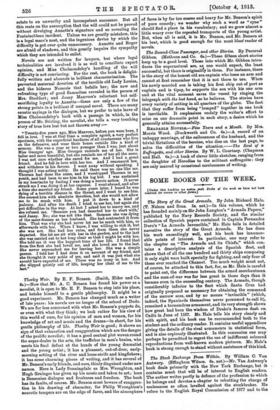Thorley Weir. By E. F. Benson. (Smith, Elder and Co.
6s.)—Now that Mr. A. C. Benson has found his power as a novelist, it is open to Mr. E. F. Benson to step into his place, and betake himself to a gentle philosophy. It might be a good experiment. Mr. Benson has changed much as a writer of late years : his novels are no longer of the school of Dodo. We are far less concerned with what Mr. Benson's puppets do, or even with what they think ; we look rather for his view of this world of ours, for his opinion of men and women, for his knowledge of art and music and the drama—in short, for his gentle philosophy of life. Thorley Weir is good; it shows no sign of that exhaustion and exaggeration which are the danger of the prolific novelist ; it has a good central plot woven round the super-dealer in the arts, the trafficker in men's brains, who meets his final defeat at the hands of the young dramatist and the young artist ; it has a pleasant, out-of-door, early- morning setting of the river and loose-strife and kingfishers ; it has some charming pieces of writing, and it has several of Mr. Benson's early friends, and ours, thinly disguised under new names. Here is Lady Sunningdale as Mrs. Wroughton, and Hugh Grainger has given up his music and taken to art ; here is Bensoniau dialogue and freshness and freedom. The book has its faults, of course. Mr. Benson must beware of exaggera- tion in his drawing of character, for Philip Wroughton's neurotic tempers are on the edge of farce, and the atmosphere of farce is by far too coarse and heavy for Mr. Benson's spirit of pure comedy ; we wonder why such a word as " eyne" should find a place in his vocabulary; and we grow almost a little weary over the repeated transports of the young artist. But, when all is said, it is Mr. Benson, and Mr. Benson at his best, which is good enough for the most blasé reader of novels.


































































 Previous page
Previous page